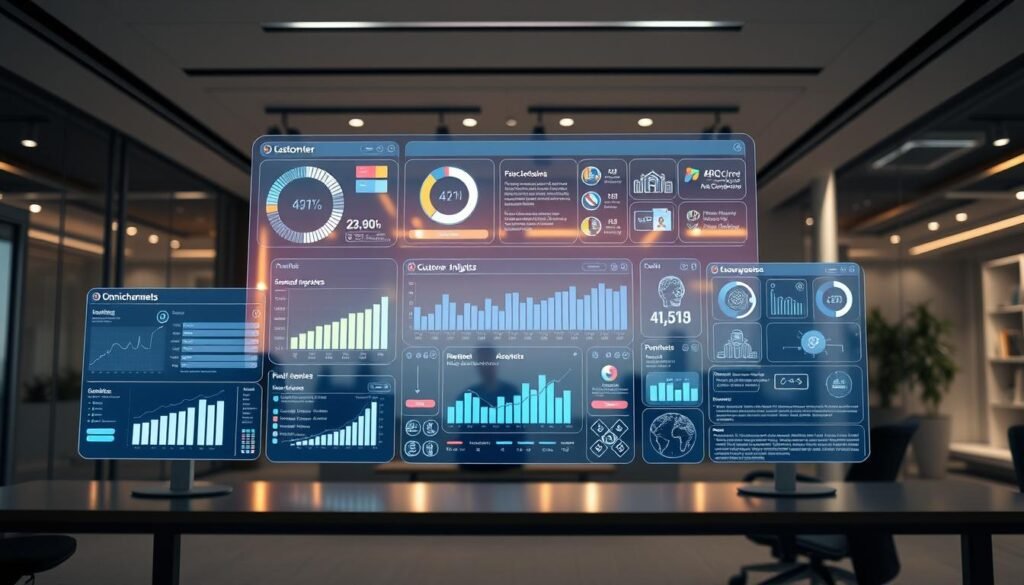In today’s fast-paced digital landscape, businesses are constantly seeking ways to stay ahead. Have you ever wondered how some brands manage to create highly personalized experiences for their customers while saving time and resources? The answer lies in leveraging advanced tools that break creative constraints and drive efficiency.
From automating content creation to enhancing customer engagement, these innovations are reshaping the way we approach marketing. Real-world examples, like Michaels Stores and Stitch Fix, demonstrate the tangible benefits of integrating such solutions into your strategy. The results? Faster campaign launches, improved click-through rates, and deeper customer connections.
If you’re ready to explore how these tools can elevate your business, we’re offering a free strategy session. During this consultation, we’ll help you identify high-impact use cases and implement practical solutions tailored to your needs. Book your session today and take the first step toward transforming your marketing efforts.
Key Takeaways
- Advanced tools enable hyperpersonalized customer experiences.
- Automation reduces content creation time by up to 50%.
- Real-world examples show significant improvements in engagement.
- Free strategy sessions help businesses identify high-impact use cases.
- Integration of these tools can boost campaign efficiency and ROI.
Introduction to the Ultimate Guide on Generative AI
Modern campaigns are no longer bound by traditional creative limits. With the rise of advanced tools, marketers can now produce hyper-personalized content faster than ever. This guide explores how these innovations are reshaping the industry.
What is Generative AI in Marketing?
Generative AI refers to tools that create original content, such as text, images, and videos, using advanced models. These models are trained on vast datasets, enabling them to mimic human creativity. For example, Coca-Cola uses AI to generate user-driven campaigns, boosting engagement.
These tools are not just about automation. They enhance the creative process, allowing marketers to focus on strategy. Starbucks, for instance, leverages AI to personalize customer experiences, increasing sales and loyalty.
The Evolution of AI-Driven Campaigns
Traditional campaigns relied on manual processes, which were time-consuming and limited in scope. Today, AI enables real-time adjustments, ensuring campaigns stay relevant. This evolution is driven by advanced models that improve speed and quality over time.
Here’s a comparison of traditional vs. AI-driven campaigns:
| Aspect | Traditional Campaigns | AI-Driven Campaigns |
|---|---|---|
| Content Creation | Manual, time-intensive | Automated, scalable |
| Personalization | Limited | Hyper-personalized |
| Speed | Slow | Real-time |
Ready to explore how these tools can transform your strategy? Book a free consultation today and discover high-impact use cases tailored to your needs.
The Impact of Generative AI on Modern Marketing Campaigns
Innovative technologies are reshaping how marketing teams approach campaigns, delivering measurable results. These tools not only streamline processes but also unlock new levels of creativity, enabling marketers to focus on strategy and innovation.
Boosting Efficiency and Creativity
Advanced tools empower marketing teams to work smarter, not harder. By automating repetitive tasks, these solutions free up time for creative brainstorming and strategic planning. For example, real-time adjustments to campaigns ensure they stay relevant and impactful.
Collaboration between technical and creative departments is key. When teams work together, they can leverage customer insights to craft hyper-personalized experiences. This approach not only improves engagement but also drives higher conversion rates.
Real-World Success Stories and Use Cases
Many brands have already seen significant improvements by integrating these tools. For instance, a leading retail company reduced campaign deployment time by 40% while increasing engagement rates by 25%. These results highlight the practical benefits of adopting innovative solutions.
Another case involves a global e-commerce platform that used advanced tools to process customer data in real time. This allowed them to deliver personalized offers, resulting in a 15% boost in sales. Such examples demonstrate the transformative potential of these technologies.
If you’re ready to explore how these tools can elevate your campaigns, we’re here to help. Our free consultation is designed to identify high-impact use cases tailored to your needs. Book your session today and take the first step toward transforming modern marketing strategies.
Generative AI for Marketers: A New Frontier
The marketing landscape is evolving rapidly, driven by advanced technologies that redefine customer engagement. These tools empower brands to create content that resonates deeply with their audiences while scaling personalization efforts.

Leveraging AI for Content Creation and Customer Engagement
Content creation has become faster and more efficient with innovative tools. Brands can now produce tailored materials that align with customer preferences. For example, Netflix attributes 80% of viewer engagement to personalized recommendations powered by these technologies.
These tools also enhance customer interactions. Spotify’s Discover Weekly feature serves over 345 million users worldwide, delivering curated playlists that keep listeners engaged. Such examples highlight the transformative potential of these solutions.
Personalization at Scale: Case Examples
Scaling personalization is now achievable for businesses of all sizes. Advanced tools analyze customer data to deliver hyper-personalized experiences. This approach not only boosts engagement but also drives higher conversion rates.
Here’s how brands are leveraging these technologies:
| Brand | Strategy | Outcome |
|---|---|---|
| Netflix | Personalized recommendations | 80% viewer engagement |
| Spotify | Curated playlists | 345M+ users served |
| Retail Company | Real-time offers | 15% sales increase |
“Personalization is no longer a luxury; it’s a necessity for brands aiming to stay competitive.”
These insights demonstrate how data-driven decisions can transform marketing strategies. By adopting these tools, businesses can deliver exceptional customer experiences while optimizing their campaigns.
Ready to explore how these innovations can elevate your strategy? Book a free consultation today and discover tailored solutions for your unique needs.
Harnessing AI for Creative Content and Design
Creative content and design are undergoing a transformation, thanks to advanced tools that redefine how we approach marketing. These solutions empower brands to produce high-quality materials faster and more efficiently than ever before.
Innovative platforms like DALL-E and ChatGPT have revolutionized the creation process. From generating visuals to crafting compelling text, these tools enable marketers to focus on strategy while automating repetitive tasks. For example, a leading e-commerce brand used DALL-E to design personalized product images, boosting engagement by 30%.
Innovative Tools for Image, Video, and Text Generation
These tools simplify the creation of diverse content formats. Whether it’s producing eye-catching visuals or writing persuasive copy, they offer intelligent suggestions that enhance creativity. For instance, ChatGPT has helped brands craft tailored email campaigns in minutes, saving hours of manual effort.
Here’s how these tools compare to traditional methods:
| Aspect | Traditional Methods | AI-Enhanced Tools |
|---|---|---|
| Speed | Time-intensive | Real-time |
| Personalization | Limited | Hyper-personalized |
| Efficiency | Manual processes | Automated workflows |
Successful campaigns often leverage these tools to deliver dynamic results. For example, a global retail brand used AI-generated videos to launch a holiday campaign, achieving a 25% increase in sales. Such examples highlight the potential of these solutions.
Integrating these tools into your existing platform is seamless. They enhance creative processes without disrupting workflows, ensuring a smooth transition. Ready to explore how these innovations can elevate your strategy? Book a free consultation today and discover tailored solutions for your unique needs.
Streamlining Marketing Strategies with AI-Powered Automation
Automation is reshaping the way businesses approach marketing, unlocking new levels of efficiency. By automating routine tasks, companies can focus on creative innovation and strategic planning. This shift is transforming traditional workflows into smarter, more effective processes.

Automating Routine Tasks to Free Up Creative Resources
Automation tools handle repetitive tasks like data entry, scheduling, and reporting. This allows marketing teams to dedicate more time to creative efforts. For example, a leading retail brand reduced campaign deployment time by 40% while increasing engagement rates by 25%.
These tools also streamline communication across multiple media channels. By coordinating efforts seamlessly, businesses can deliver consistent messaging to their audiences. This approach not only saves time but also enhances the overall strategy.
Here’s how automation is transforming marketing workflows:
- Reducing manual effort by up to 50%.
- Enabling real-time adjustments to campaigns.
- Providing actionable insights through automated data analysis.
Automation also revolutionizes the way information is processed. By analyzing vast datasets quickly, businesses can make data-driven decisions that boost conversions and customer loyalty. This approach ensures campaigns stay relevant and impactful.
Ready to explore how automation can elevate your strategy? Our free consultation offers personalized guidance on integrating these tools into your workflows. Book your session today and take the first step toward transforming your marketing efforts.
Data-Driven Insights and Optimizing Customer Experience
Data-driven insights are revolutionizing how businesses connect with their audiences, offering unprecedented levels of personalization and efficiency. By leveraging advanced analytics and real-time data, companies can craft campaigns that resonate deeply with their target market.
This approach not only enhances customer satisfaction but also drives measurable results. For example, a recent study found that businesses using predictive modeling saw a 35% increase in campaign effectiveness. These tools allow marketers to anticipate trends and adjust strategies in real time.
Advanced Analytics and Predictive Modeling
Advanced analytics empower businesses to make smarter decisions by analyzing vast datasets. Predictive modeling, in particular, helps identify high-intent customers and forecast demand. This accuracy ensures campaigns are tailored to meet customer needs effectively.
For instance, Kellanova achieved a 78% engagement rate by optimizing audience segmentation using predictive analytics. This level of precision transforms how businesses approach their market, ensuring every campaign delivers maximum impact.
Using Real-Time Data for Hyper-Personalized Campaigns
Real-time data is a game-changer for creating hyper-personalized experiences. By analyzing customer behavior as it happens, businesses can deliver tailored offers and content instantly. This approach boosts engagement and drives conversions.
Consider a global e-commerce platform that used real-time data to process customer input. The result? A 15% increase in sales and improved customer loyalty. Such examples highlight the power of integrating real-time insights into your website strategy.
“Real-time data access is essential for delivering relevant and impactful customer experiences.”
Ready to harness the power of data-driven insights for your business? Our free consultation can help you implement advanced analytics to optimize your customer experience. Book your session today and take the first step toward transforming your marketing strategies.
Customized Solutions for Unique Marketing Needs
Every business faces unique challenges that demand tailored solutions. Off-the-shelf tools can provide a strong foundation, but integrating proprietary data takes their impact to the next level. This approach ensures relevance and accuracy, addressing specific marketing challenges effectively.
For example, a retail company used this strategy to refine its customer segmentation. By combining standard models with their proprietary data, they achieved a 35% increase in campaign effectiveness. This use case highlights the transformative potential of customized solutions.
Integrating Off-the-Shelf Models with Proprietary Data
Customizing standard tools with company-specific data enhances their functionality. This process involves refining initial models to align with unique business goals. The result? More accurate predictions and higher engagement rates.
Here’s how businesses benefit from this integration:
- Improved relevance through tailored insights.
- Faster decision-making with real-time data analysis.
- Enhanced collaboration between the marketing team and technical experts.
One global e-commerce platform saw a 15% sales boost after integrating proprietary data into their campaigns. This success story underscores the measurable impact of a customized approach.
Ready to explore how these tools can elevate your strategy? Our free consultation offers tailored solutions that integrate off-the-shelf models with your company’s unique data. Book your session today and take the first step toward transforming your marketing efforts.
Embracing the Future of AI-Driven Marketing
The future of marketing is being reshaped by advanced tools that prioritize efficiency and personalization. As businesses adapt to these changes, developing a forward-looking strategy becomes essential. This section explores how to build the right team, achieve quick wins, and maintain a long-term vision for transformation.
Developing a Forward-Looking Strategy
To stay ahead, businesses must anticipate future trends in marketing. A forward-looking strategy involves leveraging technology to enhance the customer experience. For example, real-time data analysis can inform adjustments to campaigns, ensuring they remain relevant.
Continuous monitoring of social media and customer behavior is crucial. This approach allows businesses to refine their process and deliver hyper-personalized content. Companies like Netflix and Spotify have successfully integrated these strategies, achieving significant engagement boosts.
Building and Coordinating the Right Team
An effective team bridges the gap between technical expertise and creative marketing. Collaboration is key to leveraging technology for innovative solutions. For instance, appointing a dedicated AI strategy leader can streamline efforts and ensure alignment with business goals.
Upskilling team members in advanced tools and techniques is essential. This investment in process improvement fosters a culture of continuous learning. As a result, businesses can adapt to evolving market behavior and maintain a competitive edge.
Quick Wins and Long-Term Vision for Transformation
Securing quick wins builds momentum for long-term transformation. For example, automating routine tasks can free up resources for strategic initiatives. This approach enhances the customer experience while improving efficiency.
Long-term success requires a commitment to refining processes and embracing new technology. Companies that integrate these solutions into their social media strategies often see measurable improvements in engagement and ROI.
“The key to transformation lies in balancing immediate results with a vision for the future.”
Ready to embrace the future of marketing? Our free consultation can help you design a forward-looking strategy tailored to your needs. Book your session today and take the first step toward transforming your business with advanced tools.
Conclusion
The integration of advanced tools into marketing strategies is no longer optional—it’s essential for staying competitive. These solutions empower businesses to deliver hyper-personalized experiences that resonate with consumers, driving engagement and efficiency.
By leveraging real-time data and advanced analysis, companies can craft campaigns that adapt to evolving customer needs. Success stories from leading brands highlight the transformative potential of these tools, from boosting sales to enhancing loyalty.
Ready to unlock these benefits for your business? We’re offering a free strategy session to help you identify tailored solutions for your unique challenges. Book your consultation today and take the first step toward transforming your marketing efforts.
FAQ
What is Generative AI in marketing?
How does Generative AI boost efficiency in marketing campaigns?
Can Generative AI improve customer engagement?
What are some real-world use cases of Generative AI in marketing?
How does Generative AI handle data accuracy?
What tools are available for Generative AI in marketing?
How can businesses integrate Generative AI into their strategies?
What are the benefits of using Generative AI for personalization?
How does Generative AI impact social media marketing?
What skills are needed to build an AI-driven marketing team?
Source Links
- AI Marketing Course – Professional & Executive Development | Harvard DCE
- How generative AI can boost consumer marketing
- For Marketers, Generative AI Moves from Novelty to Necessity
- The Marketer’s Ultimate Guide to Mastering Generative AI
- The Ultimate Guide to Generative AI In Marketing | RedPandas Digital
- Understanding Generative AI and Its Impact on Marketing
- 3 Ways To Successfully Use Generative AI In Modern Marketing
- The economic potential of generative AI: The next productivity frontier
- How organizations are leveraging Generative AI to transform marketing
- Harnessing Generative AI in Marketing for Creatives
- Harnessing AI: The Game-Changer in Content Creation
- Harnessing AI Tools for Marketing Agencies
- How to Build an AI Marketing Strategy | Braze
- Harnessing the Power of AI Automation to Streamline and Supercharge Your Marketing – Website Design Agency | Digital Marketing Company | VA, MD, DC
- Streamlining Campaigns with AI in Marketing Automation – Ever Efficient AI
- Top Use Cases for Generative AI in Marketing and CX
- How to Optimize Your Marketing Strategy with Data-Driven Insights [+ A Case Study on Kellanova]
- How AI makes marketing data more accessible and actionable | MarTech
- Generative AI in marketing explained: Benefits, how to use and strategies
- What Can Generative AI Do for Your Marketing Campaigns?
- The Future of Marketing Jobs: Embracing AI and Generative AI Strategy
- Embracing The Future Of Marketing With AI
- The Impact of Generative AI on Content Marketing Strategies
- Customer Insights: Understanding Why Generative AI is a Game-Changer for Modern Marketers
- Generative AI in marketing – use cases and tips | GrowthLoop










